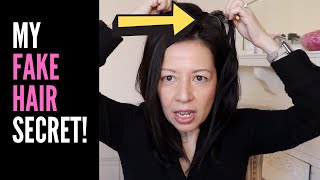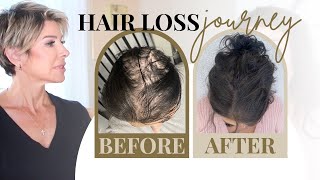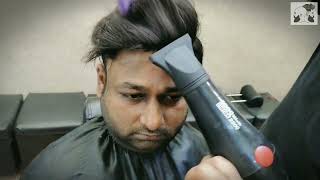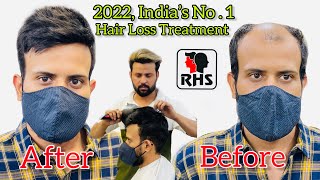The Relationship Between Hormones and Hair Loss
- Posted on 02 November, 2021
- Hair Knowledge
- By Emma & Stuart
When discussing the key reasons for female hair loss, it seems that hormones are always mentioned and for good reason. There is a proven strong connection between hormones and hair loss, with hormonal imbalances being one of the culprits. However, it's sadly not that straightforward, and to simplify it as such would be misrepresentative of how complex this relationship truly is. You see, different hormonal imbalances cause different types of hair loss, which is then further differentiated by each person's specific DNA. For example, two women experiencing menopause may both suffer hair loss, albeit in contrasting ways and to different extremities.
There are 3 hormonal conditions which are arguably the most predominant causes of hair loss in women. We'll discuss each in greater detail, to hopefully provide you with a better understanding of the relationship between hormones and hair loss!
What is a Hormone, and What Does it Do?
Simply put, hormones are the body's protein postal service, delivering messages from where that particular hormone has been made to elsewhere in the body. Messages are ‘delivered' to tissues and cells, which are then triggered to take action. Bodies produce over 200 hormones, each with diverse purposes, and which regulate everything from sex drive to appetite, hair growth to mood swings, and everything in-between. For the body to effectively function, and consequently remain healthy, hormones must stay balanced; when an imbalance occurs, this is when negative symptoms start to occur, with hair loss being just one of them.
So, what are the most commonly experienced hormonal imbalances,
and subsequent reasons for female hair loss?
Menopause and Hair Loss
When a woman enters menopause (the end of menstruation), her oestrogen levels drop to trigger menstruation's cessation. Her testosterone levels however remain the same. These strengthened testosterone levels, which previously would have been balanced out by the much higher oestrogen levels, then give rise to dihydrotestosterone (DHT), creating a hormonal imbalance in the process. As DHT is located within hair follicles, this can consequently cause said follicles to deactivate, leading to loss and thinning.
Poly Cystic Ovary Syndrome and Hair Loss
Poly Cystic Ovary Syndrome (PCOS) affects roughly 1 in 10 women and is characterised by the growth of small cysts on the ovaries, which in turn cause a hormonal imbalance, amongst other issues. Essentially, the ovaries in a person with PCOS (for reasons not quite known) produce additional testosterone, with the subsequent hormonal imbalance affecting multiple areas of a woman's health and appearance. Whilst PCOS has many different symptoms, one of the most frequently googled is undoubtedly ‘can PCOS cause hair loss?'. As with menopause, due to the higher than normal levels of testosterone, hair loss becomes a much greater possibility for someone with PCOS, as too does excessive hair growth.
Thyroid and Hair Loss
Part of the endocrine system, the thyroid gland is found in the front of the neck, with a job to create hormones which regulate cellular energy and regeneration. The relationship between the thyroid and hair loss stems from the fact that hair follicles rely on thyroid hormones to maintain their growth cycles. If these hormones are imbalanced, so too are the growth cycles. Amongst various other symptoms, excessive hair loss or growth is therefore a key symptom related to the thyroid disorders hypothyroidism (underactive thyroid) and hyperthyroidism (overactive thyroid).
Other reasons for female hair loss also exist, such as stress, giving birth, nutrient deficiencies, insulin imbalances, and exposure to endocrine disruptors. If you are experiencing hair loss issues, make an appointment with your GP to discuss your symptoms further.
If you require additional hair loss resources, be sure to keep reading our blog, which includes information on how to deal with hair loss, as well as our extensive wig buying guide. Wigs are a fantastic way to make sure your hair loss doesn't get in the way of living life to the full. If you do decide to utilise a wig on your hair loss journey, and need some assistance in doing so, please don't hesitate to get in touch or make an appointment with our friendly team of wig experts!




